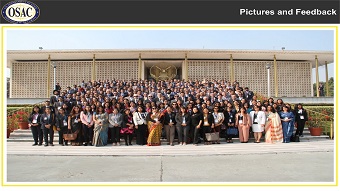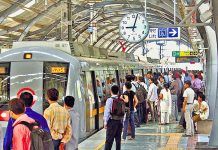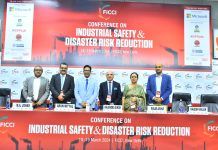OSAC Delhi Chapter held its AGM at the United States embassy recently in New Delhi. The day long event attended by nearly 300 security professionals included 5 presentations by security professionals as well as senior functionaries of the embassy.
The early morning start where invitees were also treated to a lavish breakfast spread that was laid out courtesy, G4S, the exclusive sponsors for OSAC New Delhi AGM before the official deliberations began, was an interactive event and a chance for professionals to network.
To encourage young people to choose the profession of security as their first choice of career and not something to pick up if nothing else came along, it was brilliant to invite select students to the AGM. This not only exposed them to the nuances of the profession but also provided them with an opportunity to speak to leaders from various diverse field within the security profession who were present at the AGM.
The event spearheaded by Col Harendra Bana, started off with opening thoughts by Sr. RSO- India, Mr. Gregory Levin followed by DCM – Mary Kay Loss Carlson.
The first presentation of the day ”Emerging Trends in Regional Security” was given by Mr Derek Hom – U.S. DS Dept followed by a presentation on “What is the Overseas Security Advisory Council?” by Mr Mark Lowry – Rotary Intl, OSAC Council Member.
 The next presentation, on “Fake News, Elections and You – A Look Ahead”, by Mr Leslie C. Viguerie – Pol. Affairs Dept., dwelt at length on the issue that has dominated discussions around the world significantly in the last couple of years. Prior to the lunch break the Executive Director OSAC – Washington DC, Mr. Tom Scanlon, gave his views on the subject, following which the largest gathering for any OSAC AGM, in probably the last decade, got together for a group photograph.
The next presentation, on “Fake News, Elections and You – A Look Ahead”, by Mr Leslie C. Viguerie – Pol. Affairs Dept., dwelt at length on the issue that has dominated discussions around the world significantly in the last couple of years. Prior to the lunch break the Executive Director OSAC – Washington DC, Mr. Tom Scanlon, gave his views on the subject, following which the largest gathering for any OSAC AGM, in probably the last decade, got together for a group photograph.
Post lunch came the RSO Round Table on the topic – “Security and Beyond” which was moderated by Col Harendra Bana whose quirky sense of humour kept the audience entertained throughout the day as he put his points across with wit and style.This was followed by three presentations by Shalini Paul; Pam Kazi and Richard Barta. The formal sessions ended with Chapter Presentations and Recognitions .
The final thoughts for the day were delivered by Executive Director OSAC, Mr. Tom Scanlon, who appreciated the day long deliberations. Sr. RSO India – Mr. Gregory Levin while concluding the event, in his formal vote of thanks, appreciated the hard work put in by all members of OSAC Delhi Chapter & G4S for organising and managing the event professionally.
G4S’s hospitality was overwhelming, the food and the arrangements throughout the day were handled with care and expertise and were simply superb!
The AGM received widespread appreciation from attendees who marvelled at the smoothness of the meeting that involved 300 plus invitees. Most appreciated the fact that although the attendees were of such large numbers, the schedule was followed with military precision and speakers were careful to stick to the time limit prescribed. OSAC Delhi Chapter says that they had been flooded with accolades after what was the largest AGM they have ever had.
The Overseas Security Advisory Council (OSAC) was created in 1985 under the Federal Advisory Committee Act to promote security cooperation between American private-sector interests worldwide and the U.S. Department of State. OSAC has developed into an enormously successful joint venture, with U.S. companies and organizations receiving the tools they need to cope with security issues in a foreign environment. New Delhi has a very active OSAC Chapter that interacts frequently and meets on a quarterly basis.
OSAC Mumbai Council and PSP discuss “Future Security Leaders – Emerging Contours” at Q4 meeting.
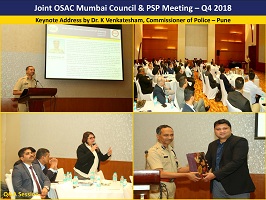 OSAC Mumbai Council & Pune Security Professionals (PSP) jointly held their Q4 meeting at Westin Pune. The keynote address was given by chief guest Dr. K Venkatesham, Commissioner of Police – Pune.
OSAC Mumbai Council & Pune Security Professionals (PSP) jointly held their Q4 meeting at Westin Pune. The keynote address was given by chief guest Dr. K Venkatesham, Commissioner of Police – Pune.
The opening address was given by Hervirender Singh, Co-Chairman, OSAC Mumbai, followed by a series of panel discussions and addresses by speakers especially invited for the event. The multiple topics that were discussed at the meeting included “Future Security Leaders – Emerging Contours from Surender Bhardwaj, Northern Trust.
This was followed by a panel discussion security challenges in the hotel industry where Hervirender Singh (Marriott), Manish Kar (ITC Hotels), Raj Mahto (Hyatt), Yogesh Pote (Marriott) discussed the various risks to the hospitality industry and what is being done to counter the risk. The panel listed out the various steps being taken to mitigate the threats to the hotel industry. This was followed by a “Crisis Management Masterclass” moderated by International SOS & Control Risks.
The closing address of the event was given by Mr Mangesh Kate & Sunil Beedlam from PSP.
FSAI signs MOU with the Architecture Council of India to include fire safety in B.Arch. courses
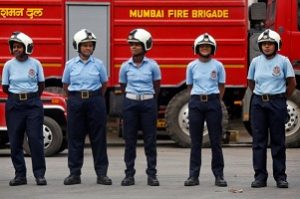 It will soon be made mandatory for architecture students to study fire safety and rescue aspects as part of their course. The move is aimed at preparing students to be part of the smart city project and related developments. The Fire and Security Association of India (FSAI) has signed a memorandum of understanding with the Architecture Council of India to offer it as part of the course curriculum for students pursuing architecture.
It will soon be made mandatory for architecture students to study fire safety and rescue aspects as part of their course. The move is aimed at preparing students to be part of the smart city project and related developments. The Fire and Security Association of India (FSAI) has signed a memorandum of understanding with the Architecture Council of India to offer it as part of the course curriculum for students pursuing architecture.
The FSAI has designed a syllabus for these students and the same has been placed before the Council for approval. Students now study Mechanical Engineering and Plumbing Service as an optional subject in architecture. However, soon, with fire safety aspects also included, the subject will be made mandatory for students to get their degree.
Should the syllabus be approved, students will be mandated to study the subject from 2019. About 60,000 students will study the subject every academic year in the state.
Pankaj Dharkar, international president, FSAI, told DH, “We are moving towards having smart cities. This means, a need to have smart buildings. To construct and maintain these, it is essential to train manpower. This is the first step towards it,” he said.
The 120-hour module that students will study as part of the course has been designed by consulting safety experts. “We will also train faculty in architecture colleges to be able to teach students,” he added.
The FSAI now has 500 members, who will help students learn the module, according to Prashanth Gururaj, another member of the FSAI. In the sixth semester, students will study life safety, in the seventh, it will be an integrated building management service. While submitting their projects in the eighth semester, it will be made mandatory for students to explain safety aspects as a separate exercise. “Members of FSAI will assess the student projects,” said Gururaj



